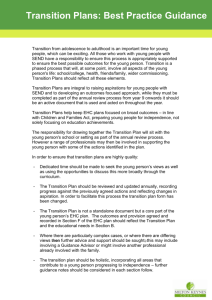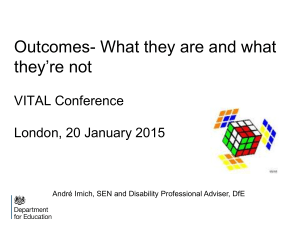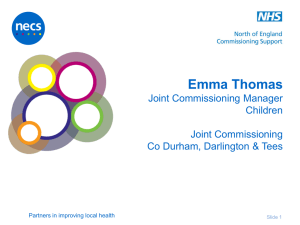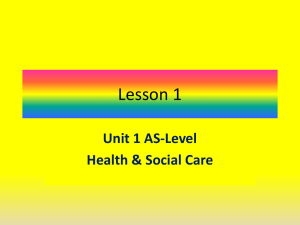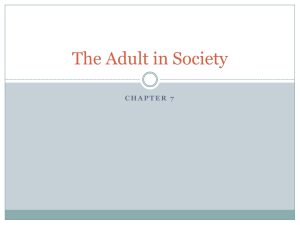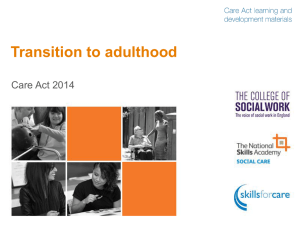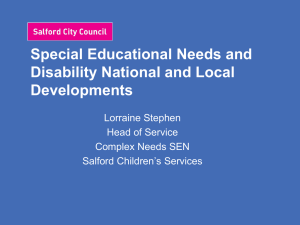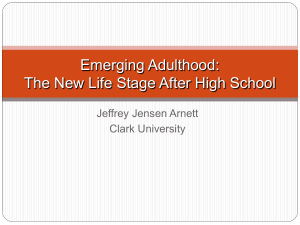FP1 Transforming Transition Julie Hitchin Nicola Gitsham
advertisement
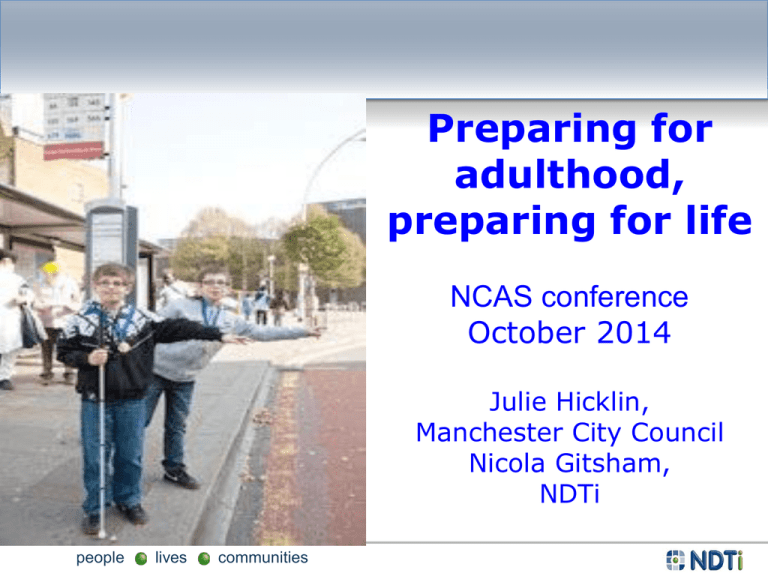
Preparing for adulthood, preparing for life NCAS conference October 2014 Julie Hicklin, Manchester City Council Nicola Gitsham, NDTi people lives communities Case for change – young people and families Too many families have to battle to find out what support is available and in getting the help they need from education, health and social care services Young people with SEND do less well than their peers at school and college and are more likely to be out of education, training and employment at 18. Also more likely to have poor outcomes in housing, health and be socially isolated Lack of joined up working across agencies and planning ahead Low aspirations throughout the system Cliff edge at 19 people lives communities What do young people and their families have to say? Young people overwhelmingly have a poor experience of transition, both in terms of services and in terms of having the level of autonomy and control they desire (Public Service Works, 2011) “The main thing I would change is making it so that when you move on from children’s services it doesn’t feel as though you have disappeared off the face of the earth” ‘My son has been getting ready to be 18 for 17 years and we still don’t know what is available after school.’ Parent from Aspirations for Life people lives communities “Everybody seems to want to do the right thing, but there seems to be a missing link. No one seems to work together” I have the same aspirations for my son as I do for my other boys, to have friends, meet someone, be happy and hopefully get a job, I just have no faith that the system can deliver it so I ask for what I think is the best it can offer’ Parent from Getting a Life 3 Case for change – health “ Poor transition can lead to frankly disastrous health outcomes for both physical and mental health….at its worse poor transition leads to drop out from medical care for those with a long term condition, and deterioration in those with disabilities - both leading to unnecessary, costly and often distressing hospital admissions “ Children and Young Peoples Health Outcomes Forum 2012 people lives communities Case for change – local authorities Rising demand Reducing budgets Difficulties predicting demand High expectations Challenge of getting joined up vision, processes and pathways 0-25 and across all agencies people lives communities Time for a new approach . people lives communities Wind is blowing in the right direction Children and Families Act and Care Act people lives communities Children and Families Act 2014 – key points A comprehensive, birth to 25 SEND system, giving new rights and protections to 16-25 year olds in further education and training. Children, young people and their families must be involved in discussions and decisions about their individual support and local provision. The right to make requests and decisions under the Children and Families Act will apply directly to disabled young people and those with SEN, over compulsory school age (the end of the academic year in which they turn 16) rather than to their parents. New 0 to 25 Education, Health and Care Plans, replacing the current system of Statements and Learning Difficulty Assessments, which reflects the child or young person’s aspirations for the future, as well as their current needs. people lives communities Children and Families Act – key points Personal Budgets – young people have the right to request a personal budget as part of the EHC planning process. Local Offer – must include support available to children and young people to help them to prepare for adulthood Joint Commissioning – must integrate education, health and care to promote well-being and must put in place joint commissioning arrangements including securing provision set out in EHC plans. The Children and Families Act applies to children and young people aged 0 – 25 which means this also includes integration of children’s and adults services. people lives communities http://www.preparingforadulthood.org.uk/resources/pfa-resources/delivering-supportand-aspiration people lives communities Care Act 2014: In force from April 2015 Wellbeing principle Including particular focus on key outcomes (employment, health, suitable accommodation and community participation) Child and Carers Needs Assessment Duty to carry out if ‘likely need’ and ‘significant benefit’ conditions apply Personal Budgets Adult care and support plans will all include a personal budget Information & Advice Service Duty to establish and maintain a service for individuals and their carers Joint commissioning & Market development Duty to ensure the integration of care and support with health provision and health-related provision Duty to ensure co-operation between children’s and adults’ services to promote the integration of care and support with health services, so that young adults are not left without care and support as they make the transition between child and adult social care Duty to promote the efficient and effective operation for a market in services for meeting care and support needs people lives communities New legislative framework for transition to adulthood Common areas: • Outcomes • Assessment and planning • Joint Commissioning and personal budgets • Information, Advice and Support http://www.preparingforadulthood.org. uk/resources/pfaresources/factsheet-the-children-andfamilies-act-and-the-care-act people lives communities 1 2 Preparation for adulthood outcomes and key themes people lives communities Changing the conversation • Developing relationships between young people, families professionals and community based on openness and trust • Workforce development for early years and health staff • Asset based approaches to planning • Helping families think about the future and learn what is possible and what works • Positive employment strategies people lives communities Employment What works • Raising aspirations from early on • Meaningful work experience from Year 10 including Saturday and holiday jobs • Families who believe employment is positive and possible • Person centred outcome focused planning that includes employment • Employment focused cirriculum including travel training • Vocational profiling • Post 16 provision that does what works (supported internships, traineeships, apprenticeships, self employment) • Supported employment whilst at school or college people lives communities Supported Employment Work with the job seeker •Engagement •Getting to know you •Agreeing a plan together Work with the employer •Engagement •Understanding needs and identifying vacancies •Getting to know the job Job match •Employers get the right worker and jobseekers get the right job Arranging the right support DEVELOP A CAREER people lives communities Supported Internships http://www.preparingforadulthoo d.org.uk/supportedinternships people lives communities Study programmes Learning Difficulty Assessment, Statement of SEN or EHC plan Place and train approach to learning Based primarily at an employer’s premises Meets the career goals of young people and the business need of an employer On-the-job training Qualifications Employment support and personal budgets 4 barriers: • Low expectations • Commissioner and practitioner attitudes to employment • Personal budget process • Availability of good evidence based support • http://www.ndti.org.uk/uploads/fil es/Insights_21_Personal_Budget s_and_employment_support.pdf people lives communities people lives communities people lives communities The Local Offer – and market shaping The reforms give us a great opportunity to commission for outcomes The Local Offer can play a role in shaping the market Feedback will highlight gaps and what’s not working Providers using with young people and families to put together a ‘good week’ – including mix of education / employment / volunteering /leisure / independent living and travel skills / meeting friends people lives communities Planning ahead – forecasting demand • Use of national and local data to forecast demand • Regular and informal communication with SEN team,16-19 commissioner, Children with Disabilities team and Adult social care • Transition database drawing from range of sources • Transition finance group • Ability to interpret SEN data against adult criteria • Use of good data analysis to draw from and collate multiple datasets • EHC plans in Year 9 and the Local Offer Annual preparing for adulthood reviews that update information and predict demand people lives communities Manchester’s 7 principles for change Transition Principles and Behaviour Change Low Level HousingRelated Support Robust Governance for Support & Challenge Improving Transition Managing demand via Parent/Carers people lives Strengthened Social Care Offer Cohort Analysis & Improved Intelligence Early Help Offer communities Manchester All Age Disability Strategy – key themes 1. 2. 3. 4. 5. 6. 7. 8. Health and Well-being Staying Safe Getting off to a Good Start Choice and Control Independence in your Home Community Opportunities Involvement Advocacy people lives communities Housing and support Matthew’s Story Matthew’s Big Plan. High aspirations for an ordinary life. Employment, independent living including supported living, friends and relationships. Work experience from age 11 Input from Adult Social Care: Personal Budget? (Enough to pay Job Coach?) Link to Housing Association Project Search and job coach – integrated funding from employment, education and social care Now: Living independently and in a job he loves; www.media19.co.uk/production/Matthews-story people lives communities Community Inclusion - Eleanor’s Story Outcomes: • Develop friendships • To be part of her community • Explore setting up a micro/social enterprise • Improve expressive communication Personalised Post 16 options and support: people lives communities • Personal budget from post 16 education and social care pooled and taken as a direct payment; • Team of personal assistants recruited and trained; • Personalised weekly timetable designed to achieve outcomes; • Personal assistants can continue to support Eleanor when she leaves education and eventually moves into supported living. Multi agency (education, health and social care) assessment and planning – Hertfordshire • Developing the workforce in person centred, outcome focused planning and PfA outcomes • 3 way funded transition support workers who deliver preparing for adulthood approach • Changing the conversation – Living Live sessions • Early intervention – information from the local offer and plans from Year 9 used to inform demand commissioning of post 16 options and support. people lives communities Developing local post 16 education and training providers - Hertfordshire • Used strategic reform grant to support workforce development and partnership • Supported Employment advisors working in schools and colleges • Joint funded 5 day offer (3 days with college 2 at schools to encourage moving on) • Working with housing providers to provide local residential/short breaks offer • Curriculum development project to see how study programmes can be developed to prepare for life, Job coaching training across 5 colleges people lives communities people lives communities Support available to local areas - Pathfinder Champions North West Wigan, Manchester, Salford & Lancashire North East Darlington and Early Support Yorkshire and Humber Calderdale and York West Midlands Consortium of all 14 LAs East Midlands Leicester and Nottinghamshire East of England Hertfordshire and Bedford London 1 Bromley, Bexley and Enfield London 2 SE7 South East SE7 South West 1 Cornwall South West 2 Southampton and Portsmouth http://www.sendpathfinder.co.uk/pathfinderchampions/ people lives communities Support available to local areas – delivery partners Delivery Partners Preparing for Adulthood Contact a Family Council for Disabled Children Early Support Information, Support and Advice Services Network National Network for Parent Carer Forums The Communications Trust The Dyslexia-SpLD Trust Autism Education Trust people lives communities Preparing for Adulthood Programme • Commissioned by DfE to support the testing and implementation of SEND reforms • Delivered by the NDTi and CDC • Free training, support and resources Contact Information: • www.preparingforadulthood.org.uk • info@preparingforadulthood.org.uk • www.facebook.com/preparingforadulthood • Twitter - @PfA_Tweets people lives communities Contact Information Website: www.preparingforadulthood.org.uk Facebook: www.facebook.com/ndti.org.uk Twitter: @nicolagitsham Blog: www.ndti.org.uk/blog people lives communities

